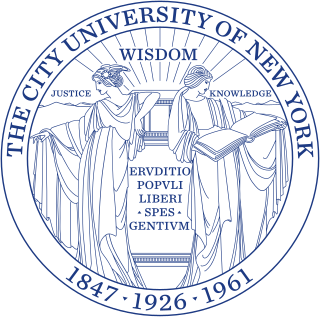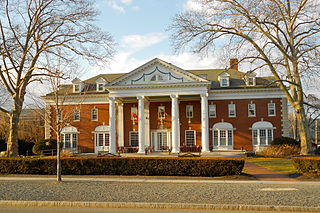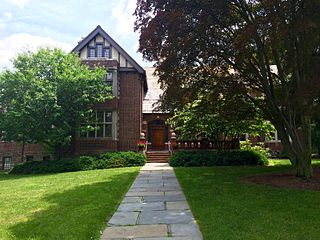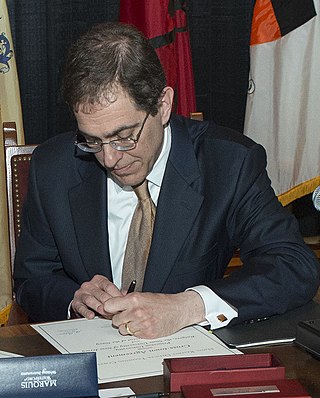Related Research Articles

The City University of New York is the public university system of New York City. It is the largest urban university system in the United States, comprising 25 campuses: eleven senior colleges, seven community colleges, and seven professional institutions. In 1960, John R. Everett became the first chancellor of the Municipal College System of New York City, later known as the City University of New York (CUNY). CUNY, established by New York State legislation in 1961 and signed into law by Governor Nelson Rockefeller, was an amalgamation of existing institutions and a new graduate school.

The Ivy League is an American collegiate athletic conference of eight private research universities in the Northeastern United States. The term Ivy League is used more broadly to refer to the eight schools that belong to the league, which are globally-renowned as elite colleges associated with academic excellence, highly selective admissions, and social elitism. The term was used as early as 1933, and it became official in 1954 following the formation of the Ivy League athletic conference.

Princeton University is a private Ivy League research university in Princeton, New Jersey. Founded in 1746 in Elizabeth as the College of New Jersey, Princeton is the fourth-oldest institution of higher education in the United States and one of the nine colonial colleges chartered before the American Revolution. The institution moved to Newark in 1747, and then to its current campus, nine years later. It officially became a university in 1896 and was subsequently renamed Princeton University.

The American Whig–Cliosophic Society, sometimes abbreviated as Whig-Clio, is a political, literary, and debating society at Princeton University and the oldest debate union in the United States. Its precursors, the American Whig Society and the Cliosophic Society, were founded at Princeton in 1769 and 1765.

The Princeton School of Public and International Affairs is a professional public policy school at Princeton University. The school provides an array of comprehensive coursework in the fields of international development, foreign policy, science and technology, and economics and finance through its undergraduate (AB) degrees, graduate Master of Public Affairs (MPA), Master of Public Policy (MPP), and PhD degrees.

Campus Club was one of the undergraduate eating clubs at Princeton University. Located on the corner of Washington Road and Prospect Avenue, Campus was founded in 1900. It was one of the eating clubs that abandoned the selective bicker process to choose members non-selectively, a status it held for over twenty years.

The Daily Princetonian, originally known as The Princetonian and nicknamed the 'Prince', is the independent daily student newspaper of Princeton University. The newspaper is owned by The Daily Princetonian Publishing Co. and boasts a circulation of 2,000 in print and around 30,000 daily online hits as of 2021. Managed by approximately 200 undergraduate students, the newspaper covers a range of sections, including news, sports, and opinions.

Woodrow Wilson High School is a Los Angeles Unified School District (LAUSD) high school in the Northeast region of Los Angeles, California, United States. It is located in the community of El Sereno, atop the Ascot Hills at 4500 Multnomah Street.

First College, the first of Princeton University's six residential colleges, was developed in the late 1950s when a group of students formed the Woodrow Wilson Lodge as an alternative to the eating clubs. The Woodrow Wilson Lodge members originally met and dined in Madison Hall, which is now part of John D. Rockefeller III College. Inspired by the ideas of Woodrow Wilson, president of Princeton from 1902–1910, the members advocated a more thorough integration of academic, social and residential life on campus.
The Institute for Citizens & Scholars is a nonpartisan, non-profit institution based in Princeton, New Jersey that says it aims to strengthen American democracy by "cultivating the talent, ideas, and networks that develop lifelong, effective citizens". It administers programs that support civic education and engagement, leadership development, and organizational capacity in education and democracy.

Campus protest or student protest is a form of student activism that takes the form of protest at university campuses. Such protests encompass a wide range of activities that indicate student dissatisfaction with a given political or academics issue and mobilization to communicate this dissatisfaction to the authorities and society in general and hopefully remedy the problem. Protest forms include but are not limited to: sit-ins, occupations of university offices or buildings, strikes etc. More extreme forms include suicide such as the case of Jan Palach's, and Jan Zajíc's protests against the end of the Prague Spring and Kostas Georgakis' protest against the Greek junta of 1967–1974.
Princeton University was founded in Elizabeth, New Jersey, in 1746 as the College of New Jersey, shortly before moving into the newly built Nassau Hall in Princeton. In 1783, for about four months Nassau Hall hosted the United States Congress, and many of the students went on to become leaders of the young republic.

Princeton University eating clubs are private institutions resembling both dining halls and social houses, where the majority of Princeton undergraduate upperclassmen eat their meals. Each eating club occupies a large mansion on Prospect Avenue, one of the main roads that runs through the Princeton campus, with the exception of Terrace Club which is just around the corner on Washington Road. This area is known to students colloquially as "The Street". Princeton's eating clubs are the primary setting in F. Scott Fitzgerald's 1920 debut novel, This Side of Paradise, and the clubs appeared prominently in the 2004 novel The Rule of Four.

The Princeton University Department of Psychology, located in Peretsman-Scully Hall, is an academic department of Princeton University in Princeton, New Jersey. For over a century, the department has been one of the most notable psychology departments in the country. It has been home to psychologists who have made well-known scientific discoveries in the fields of psychology and neuroscience.

The James Madison Program in American Ideals and Institutions, often called simply the James Madison Program or the Madison Program, is a scholarly institute within the Department of Politics at Princeton University espousing a dedication "to exploring enduring questions of American constitutional law and Western political thought." The Madison Program was founded in 2000 and is directed by Robert P. George, the McCormick Professor of Jurisprudence at Princeton University.

Christopher Ludwig Eisgruber is an American academic and legal scholar who is serving as the 20th President of Princeton University, where he is also the Laurance S. Rockefeller Professor of Public Affairs in the Princeton School of Public and International Affairs and the University Center for Human Values. He is also an expert on constitutional law, with an emphasis on separation of church and state and federal judicial appointments.

Students for Justice in Palestine is a pro-Palestinian college student activism organization in the United States, Canada and New Zealand. It has campaigned for boycott and divestment against corporations that deal with Israel and organized events about Israel's human rights violations. In 2011, The New York Times reported that "S.J.P., founded in 2001 at the University of California, Berkeley, has become the leading pro-Palestinian voice on campus."

Cannon Dial Elm Club, also known as Cannon Club, is one of the historic Eating Clubs at Princeton University. Founded in 1895, it completed its current clubhouse in 1910. The club closed in the early 1970s and later merged with Dial Lodge and Elm Club to form Dial, Elm, Cannon (DEC), which closed its doors in 1998. In 2011 DEC reopened, now bearing the name Cannon Dial Elm Club, using its historic clubhouse, which had served as the home for the Office of Population Research during the club's hiatus.
Joshua Timothy Katz is an American linguist and classicist who was the Cotsen Professor in the Humanities at Princeton University until May 2022. He is a scholar on the languages, literatures, and cultures of ancient and medieval history. Currently, he is a senior fellow at the American Enterprise Institute.
References
- ↑ Shea, Christopher (2016-01-13). "Behind the Sit-In". Princeton Alumni Weekly. Retrieved 22 February 2024.
- ↑ Beer, Susan (2016-02-15). "Racism chiseled on our walls – and the fight to erase it". CNN . Retrieved 22 February 2024.
- ↑ Goldberg, Barbara (2015-12-04). "Woodrow Wilson's racism 'did some harm,' great-grandson says". Reuters . Retrieved 22 February 2024.
- 1 2 Markovich, Alexandra (2016-04-05). "Princeton Board Votes to Keep Woodrow Wilson's Name on Campus Buildings". New York Times . Archived from the original on 2016-04-04. Retrieved 22 February 2024.
- ↑ "Resurfacing history'\: A look back at the Black Justice League's campus activism". Daily Princetonian . 2020-07-28. Retrieved 22 February 2024.
- ↑ Brait, Ellen (2015-11-23). "Princeton students demand removal of Woodrow Wilson's name from buildings". The Guardian . Retrieved 22 February 2024.
- ↑ Markovich, Alexandra (2015-11-18). "Princeton Students Hold Sit-In on Racial Injustice". New York Times . Retrieved 22 February 2024.
- ↑ Vosbikian, Christina (2015-11-23). "Princeton Open Campus Coalition opposes BJL protests in letter to Eisgruber '83". Daily Princetonian .
- ↑ Merriman, Anna (2016-04-05). "Black Justice League opposes Princeton U.'s Woodrow Wilson decision". NJ.com . Retrieved 22 February 2024.
- ↑ "Classics chair calls professor's language on BJL 'absolutely abhorrent,' as Katz defends 'blunt speech'". The Princetonian. July 14, 2020. Retrieved 2022-05-22.
- ↑ "Katz defends 'blunt words' in op-ed, as Department of Classics removes condemnation from website". The Princetonian. July 27, 2020. Retrieved 2022-05-25.
- ↑ Belkin, Melissa Korn and Douglas (2022-05-23). "Princeton Board Fires Tenured Professor Joshua Katz, Backing President's Recommendation". Wall Street Journal. ISSN 0099-9660 . Retrieved 2022-05-24.
- ↑ "Princeton dismisses professor Joshua Katz 'effective immediately' after U. investigation finds policy violations". The Princetonian. Retrieved 2022-05-24.